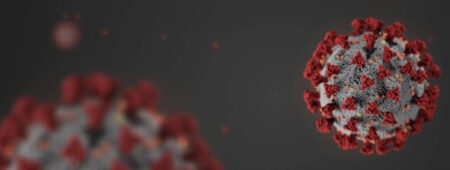
Hertz Fellows Join Fight Against COVID-19
During the Hertz Foundation’s 2020 Summer Workshop, Hertz Fellows came together to shed light on the effects of COVID-19 on the nation's healthcare system and discuss new solutions that could offer some relief amid the throes of the global pandemic.
Dozens of Hertz Fellows shifted their work back in March to focus on solutions to COVID-19, inspired by their moral commitment to work for the nation’s defense in times of national emergency.
Elizabeth Stephens, an assistant professor of surgery at the Mayo Clinic and a congenital cardiac surgeon, discussed the direct impacts of COVID-19 on doctors, patients, and surgeries in the U.S., noting reuse of inadequate personal protective equipment, doctor suicides, and patient deaths due to surgery delays, among many other challenges.
Cheri Ackerman, CEO of Concerto Biosciences, and Cameron Myhrvold, a postdoctoral fellow at the Broad Institute, shared CARMEN-Cas13, a new technology that offers high-throughput molecular testing that could provide 4500 test results for a suite of viruses in a matter of minutes, helping to alleviate the glut in testing result delays.
Potential Impact of Contact Tracing Apps
The use of contact tracing apps was a large theme during the summer workshop. Smartphone contact tracing apps track the proximity of the user to others, signaling an alert to all affected users when another confirms positive for infection. However, for these apps to have an impact on reducing the spread of COVID-19 in North America, it requires wide adoption of their use by the public.
At the close of the workshop, a panel of Hertz Fellows weighed in with possible solutions to the user adoption problem for contact tracing apps, noting that adoption by universities could help fight the spread of the virus as students return to campuses across the nation this fall. The panel members also presented the results of their work on COVID-19 from over the last few months.
Panel members and presenters at the workshop included:
- Po-Shen Loh, an associate professor of mathematics at Carnegie Mellon University, whose team developed NOVID, the first published contact tracing app in the U.S., in April this year. The NOVID app has 50,000 downloads, thanks, in part, to the Hertz Fellows community.
- William Allen, a junior fellow at Harvard University, presented on how he used survey data of COVID-19 symptoms and behaviors to map patterns useful for predicting the spread of the virus to overcome the limitations of molecular testing through machine learning techniques. Self-reported user data through the HowWeFeel app revealed that the loss of taste or smell was highly indicative of COVID-19, while symptoms or exposure in the household were highly predictive of infection. This anonymous, self-reported user data could assist public health departments in prioritizing limited testing resources.
- Kevin Esvelt, an assistant professor at Massachusetts Institute of Technology, who worked on developing technologies to discourage face-touching, is modeling the benefits of bi-directional contact tracing with the potential to double the effectiveness of current contact tracing protocols. Bi-directional contact tracing is an approach to identify not only the people who were exposed to a virus by one infected individual, but to also identify the source individual of the exposure and isolate possible “superspreaders.”
- Jacob Steinhardt, an assistant professor of statistics at Berkeley, presented on parameters in modeling useful for predicting household transmission and estimating hospital demand.
- William Yu, an assistant professor of mathematics at the University of Toronto, was involved in a large consortium for the launching of the COVI contact tracing app in Canada that uses machine learning techniques to signal partial warning alerts to users to begin self-isolating, based on their risk for infection from their social network. The app could help to alleviate strain on healthcare systems.
One key takeaway from the panel is that user adoption of contact tracing apps will likely remain limited unless the software is built into the operating system of smartphones. All panelists agreed that if universities adopt policies that encourage contact tracing app use, these apps could gain further traction in North America and help reduce possible infections of COVID-19.